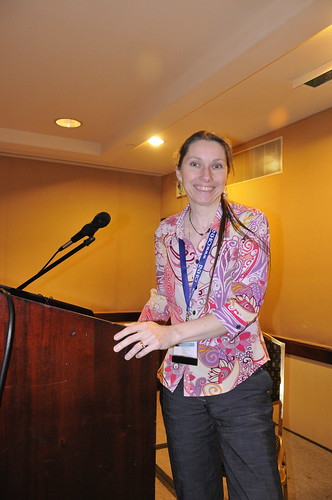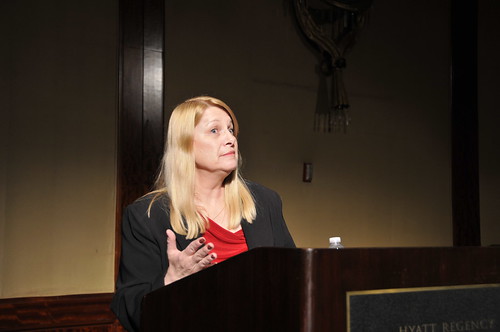VOICE 2010, Day 1 (Part 2)
(...continued from previous post)
Next up, I headed off to Liz de Nesnera ‘s presentation on “Talking Telephony”. I don’t get many jobs for that type of voice over, but I know that telephony-based voiceovers are some of most ubiquitous out there, and for people like Liz, it’s a way of life.
This was a sleeper of a panel for me. Before the hate mail starts rolling in, I mean a sleeper, not a snoozer. I wasn’t expecting to get a lot out of this panel, but I was still drawn to learn more about it. I have often said that I’ve learned the most when I didn’t think there was much to learn… this held true for Liz’s panel. Yeah, the technical stuff was pretty easy for me, and not too much was new there (although I can see some great uses for Word2Wav, especially with some of the industrials I have to do). However, the actual voice acting, general schema, etc. related to things such as IVR, voice prompts, and the like were completely new to me and a total 180 from what I expected. Add to that the approach that Liz defined, the marketing techniques she identified, and the simple (yet effective) methods of finding clients (either via direct contact, or by finding production houses which specialize in telephony VO) made this panel a very educational and entertaining one for me.

After the 11AM panel, I headed down to the exhibit hall and toured through the place to see what was being offered. Popped by the Voice Over Extra booth, and greeted John Florian. One of the big things that hit me during VOICE so far was the number of great people whom I met and converse with on a regular basis, but rarely get to see in person. If there’s one thing I do like about VOICE, it’s the ability to meet and catch up with so many people in the industry that I wouldn’t normally get to see otherwise. Unfortunatley, I’m digressing though…
John was nice enough to let me use some space at his booth to set up some gear and get a few roving interviews to share with others. First off was John himself, who was gracious enough to take some time away from what he was doing to give me a few minutes of his time to test out the recording chain. Unfortunately, I only had time for one more interview before the next panel, and I was lucky enough to get Pete Rofe’ to agree to join me for what turned into a monster interview (but a really good one, as Peter’s insights into voice over and acting in general are spot on). Once I get a chance to upload the clips, I’ll share them via the blog (and John was very kind to host the clips as well). I can’t promise the best quality due to the environment, but for those who wanted to attend, but couldn’t or weren’t sure that VOICE was for them, I think these clips will be a great way to see just what you’re missing.
After snagging those two interviews, I was able to bounce between George Whittam's panel on the Technology of Voiceover and Erik Sheppard's panel on Simple Mistakes that Talent Make. Now for those who don't know George Whittam, he's the guy behind Eldorado Recording Services. Prior to VOICE 2010, I heard one talent who was critiquing the Guests of Honor ask the question "who is George Whittam... I've never heard of him." Well, this is George Whittam, and any guy who can build a studio for the likes of the late Don LaFontaine, Joe Cipriano, and a veritable "who's who" within the voice acting community (not to mention the Don LaFontaine Voiceover Lab) is A-ok in my book. George's panel is always a good one, especially for new talent or those who don't have some kind of recording background. Even gearheads like me can pick up a few things with some of the newer technologies out there which we may have otherwise ignored. For example, I would never have bothered to utilize something like a CEntrance MicPort Pro for my "VO 2 Go" kit if I hadn't read George's reviews of the device.
(Besides, George originally hails from my hometown, West Chester PA. You've got to support the locals :)
Erik Sheppard's panel was also very good, and highlighted mistakes that pretty much any voice actor has made over the course of their career (most of which he probably enocuntered first hand in his position with Voice Talent Productions). I heard more than a few groans and such from folks who'd committed the very same faux pas that Erick discussed. It was a great panel which discussed ways in which voice over talent manage to work themselves out of a job via oversights, snafus, and by not following directions.
That last one is in bold for a reason, because while some items can be overlooked (one of my better clients was landed by a fauz pas on my part which might have seemed fatal at the time, but was turned into a positive experience for the client by the way in which I handled it), an unwillingness to follow client/agent/casting director/director directions is a very quick way to make certain that your demo gets tossed into the "ignore" pile.
The final panel for the afternoon session I attended was Beverley Bremer's panel on "How to Weat 3 Hats". I viewed this as a panel which was really good for beginner and intermediate voice talent, as too often they focus on one aspect of the voice over process (usually the talent). While that's not a bad thing per se, it can quickly lead to a myopic view that causes the talent to lose out on various opportunities. Within the voice over world, the voice actor needs to put themselves in the position of talent, director, and engineer. The talent portion of the presentation is pretty self-explanatory, however the other two are often overlooked by voice talent that is less experienced. Interpretation of what the director wants, and the ability to self-direct are as important as the acting ability according to Bremers, and I wholeheartedly agree. There's an old VO adage which states that your first take needs to be what the specs ask for, but the second should be what you think they actually want. That's self-direction for VO in a nutshell... you need to be able to understand what the copy is really asking for and then to do it.
The final item, Engineering, is a bit of a no-brainer if you have a home studio, but you'd be amazed how often people forget to do a little audio engineering during their auditions. A poorly edited file is a quick way to work yourself out of a booking that would have otherwise been yours. Especially in today's VO market, it's become more and more of a critical skill to have, and one which cannot be ignored.
By the end of Beverly's panel, I was pretty well wiped out. That's the thing with VOICE. If you try to hit everything, you're going to be wiped out at the end of the day. It's not a bad thing, but you need to be judicious when it comes to what you choose to attend, because some panels are more intensive than others.
Cheers!
-Greg
Next up, I headed off to Liz de Nesnera ‘s presentation on “Talking Telephony”. I don’t get many jobs for that type of voice over, but I know that telephony-based voiceovers are some of most ubiquitous out there, and for people like Liz, it’s a way of life.
This was a sleeper of a panel for me. Before the hate mail starts rolling in, I mean a sleeper, not a snoozer. I wasn’t expecting to get a lot out of this panel, but I was still drawn to learn more about it. I have often said that I’ve learned the most when I didn’t think there was much to learn… this held true for Liz’s panel. Yeah, the technical stuff was pretty easy for me, and not too much was new there (although I can see some great uses for Word2Wav, especially with some of the industrials I have to do). However, the actual voice acting, general schema, etc. related to things such as IVR, voice prompts, and the like were completely new to me and a total 180 from what I expected. Add to that the approach that Liz defined, the marketing techniques she identified, and the simple (yet effective) methods of finding clients (either via direct contact, or by finding production houses which specialize in telephony VO) made this panel a very educational and entertaining one for me.

After the 11AM panel, I headed down to the exhibit hall and toured through the place to see what was being offered. Popped by the Voice Over Extra booth, and greeted John Florian. One of the big things that hit me during VOICE so far was the number of great people whom I met and converse with on a regular basis, but rarely get to see in person. If there’s one thing I do like about VOICE, it’s the ability to meet and catch up with so many people in the industry that I wouldn’t normally get to see otherwise. Unfortunatley, I’m digressing though…
John was nice enough to let me use some space at his booth to set up some gear and get a few roving interviews to share with others. First off was John himself, who was gracious enough to take some time away from what he was doing to give me a few minutes of his time to test out the recording chain. Unfortunately, I only had time for one more interview before the next panel, and I was lucky enough to get Pete Rofe’ to agree to join me for what turned into a monster interview (but a really good one, as Peter’s insights into voice over and acting in general are spot on). Once I get a chance to upload the clips, I’ll share them via the blog (and John was very kind to host the clips as well). I can’t promise the best quality due to the environment, but for those who wanted to attend, but couldn’t or weren’t sure that VOICE was for them, I think these clips will be a great way to see just what you’re missing.
After snagging those two interviews, I was able to bounce between George Whittam's panel on the Technology of Voiceover and Erik Sheppard's panel on Simple Mistakes that Talent Make. Now for those who don't know George Whittam, he's the guy behind Eldorado Recording Services. Prior to VOICE 2010, I heard one talent who was critiquing the Guests of Honor ask the question "who is George Whittam... I've never heard of him." Well, this is George Whittam, and any guy who can build a studio for the likes of the late Don LaFontaine, Joe Cipriano, and a veritable "who's who" within the voice acting community (not to mention the Don LaFontaine Voiceover Lab) is A-ok in my book. George's panel is always a good one, especially for new talent or those who don't have some kind of recording background. Even gearheads like me can pick up a few things with some of the newer technologies out there which we may have otherwise ignored. For example, I would never have bothered to utilize something like a CEntrance MicPort Pro for my "VO 2 Go" kit if I hadn't read George's reviews of the device.
(Besides, George originally hails from my hometown, West Chester PA. You've got to support the locals :)
Erik Sheppard's panel was also very good, and highlighted mistakes that pretty much any voice actor has made over the course of their career (most of which he probably enocuntered first hand in his position with Voice Talent Productions). I heard more than a few groans and such from folks who'd committed the very same faux pas that Erick discussed. It was a great panel which discussed ways in which voice over talent manage to work themselves out of a job via oversights, snafus, and by not following directions.
That last one is in bold for a reason, because while some items can be overlooked (one of my better clients was landed by a fauz pas on my part which might have seemed fatal at the time, but was turned into a positive experience for the client by the way in which I handled it), an unwillingness to follow client/agent/casting director/director directions is a very quick way to make certain that your demo gets tossed into the "ignore" pile.
The final panel for the afternoon session I attended was Beverley Bremer's panel on "How to Weat 3 Hats". I viewed this as a panel which was really good for beginner and intermediate voice talent, as too often they focus on one aspect of the voice over process (usually the talent). While that's not a bad thing per se, it can quickly lead to a myopic view that causes the talent to lose out on various opportunities. Within the voice over world, the voice actor needs to put themselves in the position of talent, director, and engineer. The talent portion of the presentation is pretty self-explanatory, however the other two are often overlooked by voice talent that is less experienced. Interpretation of what the director wants, and the ability to self-direct are as important as the acting ability according to Bremers, and I wholeheartedly agree. There's an old VO adage which states that your first take needs to be what the specs ask for, but the second should be what you think they actually want. That's self-direction for VO in a nutshell... you need to be able to understand what the copy is really asking for and then to do it.
The final item, Engineering, is a bit of a no-brainer if you have a home studio, but you'd be amazed how often people forget to do a little audio engineering during their auditions. A poorly edited file is a quick way to work yourself out of a booking that would have otherwise been yours. Especially in today's VO market, it's become more and more of a critical skill to have, and one which cannot be ignored.
On that note, I'm going to try and get some rest before Day 2. There's nothing worse than trying to attend these panels when you're batteries need major recharging.
By the end of Beverly's panel, I was pretty well wiped out. That's the thing with VOICE. If you try to hit everything, you're going to be wiped out at the end of the day. It's not a bad thing, but you need to be judicious when it comes to what you choose to attend, because some panels are more intensive than others.
Cheers!
-Greg
Labels: blog, blogging, equipment, gear, recording equipment, studio, VOICE 2010, voice acting, voice actor, voice actors, voice artist, voice over, voice talent, voiceover, voiceoverxtra











1 Comments:
Thanks for sharing your experiences Greg! It sounds like you were incredibly busy at the conference!
Post a Comment
Subscribe to Post Comments [Atom]
<< Home